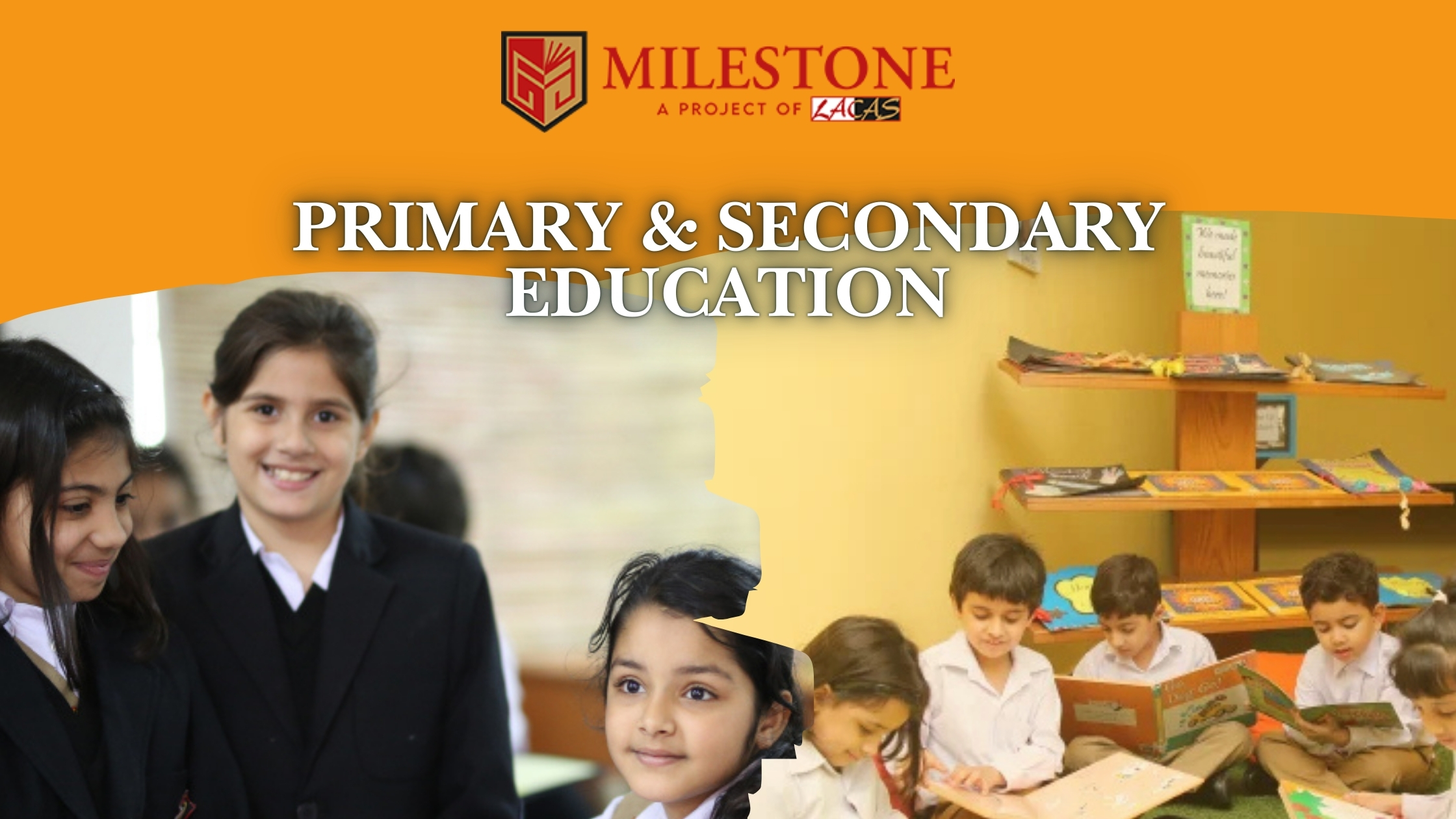According to the Pakistan Education Statistics Report (2023), primary education enrollment has increased by 12% in the past five years. Meanwhile, secondary education enrollment has also seen a rise of 9%.
This reflects the growing value placed on education in preparing students for the future. And the journey starts with understanding the difference between secondary and primary education.
Let’s explore the differences between these stages of education, their syllabi, subject selections, and how they shape a student’s academic journey.
The Importance of Understanding the Difference
Education forms the backbone of a child’s future. This makes it crucial for parents/guardians and students to understand the schooling structure. It helps make informed decisions when getting admission into institutions or transitioning between stages.
The education system is divided into stages, with primary and secondary education serving as its main pillars. Each stage plays a unique role in shaping a child’s academic and personal growth.
What is Primary Education?
Primary education in Pakistan covers Grades 1 to 5 and is the initial formal step in a child’s academic journey. It focuses on building foundational skills in literacy, numeracy, and general knowledge. This stage sets the groundwork for lifelong learning and academic success.
Subjects in Primary Schools
The curriculum for primary schools is designed to introduce young learners to basic concepts across various disciplines. Key subjects include:
- English: Introducing basic grammar, vocabulary, and sentence structure.
- Islamiyat (for Muslims): Teaching Islamic studies, including Quranic verses, prayers, and ethics.
- Mathematics: Building fundamental skills like addition, subtraction, multiplication, and division.
- Science: Covering basic concepts of the natural world, including plants, animals, and weather.
- Urdu: Developing reading and writing skills in the national language.
- Social Studies: Introducing concepts like geography, history, and culture.
Primary education focuses on engaging teaching methods like storytelling, group activities, and hands-on learning to keep students interested and motivated.
What is Secondary Education?
Secondary education in Pakistan begins after Grade 5 and is divided into two levels:
- Middle School (Grades 6 to 8): Prepares students for more in-depth studies.
- High School (Grades 9 and 10): Corresponds to the Secondary School Certificate (SSC), commonly known as Matriculation.
This stage focuses on building critical thinking skills, subject specialization, and preparing students for higher education.
Subjects in Secondary Schools
The curriculum becomes more specialized in secondary education. Students at this level can choose subject groups based on their interests and future career goals.
Compulsory subjects include Urdu, English, Mathematics, Islamiyat, and Pakistan Studies. On the other hand, the elective subjects include the science group (Physics, Chemistry, and Biology/Computer Science), humanities subjects (Civics, Economics, and Education or Fine Arts), and technical/vocational subjects.
Secondary education focuses on conceptual learning, practical application, and exam preparation. It plays an important role in shaping a student’s academic path and career aspirations.
An Overview of Primary and Secondary Education
| Aspect | Primary Education | Secondary Education |
| Grades Covered | Grades 1 to 5 | Grades 6 to 10 |
| Age Group | 5 to 10 years | 11 to 16 years |
| Focus of Learning | Foundational skills in reading, writing, and numeracy. | Subject specialization and critical thinking. |
| Subjects | Urdu, English, Mathematics, Science, Islamiyat, Social Studies. | Urdu, English, Mathematics, Pakistan Studies, Islamiyat, and elective subjects like Physics, Chemistry, Biology, etc. |
| Teaching Methods | Activity-based learning, storytelling, and group activities. | Lectures, practical work, and self-study. |
| Assessment | Internal assessments like classwork and quizzes. | Includes board exams such as Matriculation (SSC). |
| Curriculum Structure | General curriculum with basic concepts across subjects. | Specialized curriculum with elective groups like Science, Humanities, and Technical. |
| Extracurricular Focus | Basic activities to build social and motor skills. | Advanced activities, clubs, and competitions for skill enhancement. |
| Outcome | Prepares students for the challenges of secondary education. | Equips students with knowledge and skills for higher studies or vocational training. |
How to Choose the Right School?
If you’ve clearly understood the difference between primary and secondary education, you might now be looking for the best schools.
Remember, choosing the right school for primary and secondary education is an important decision. Analyze whether the institution will meet the student’s needs and interests.
To help you find the right school, we’ve listed down the most important points that you should never ignore:
- Check whether your chosen school offers a well-rounded curriculum.
- Do they have qualified and experienced teachers?
- Check the extracurricular opportunities and make sure those align with the student’s interests.
- Do they promote a supportive and inclusive environment?
Note: It’s always important to check the school’s national and international reputation. In addition, you can also look for any accreditations or certifications that they hold. This can help you choose the best options that have all the resources and experience to equip your child with the right skills.
How Milestone Can Help
Milestone understands the value of nurturing the youth for a brighter future. With a focus on both primary and secondary education, Milestone offers a comprehensive curriculum designed to develop students’ academic and personal skills. In addition, we’ve experienced teachers on board who use innovative teaching methods to keep students engaged.
Visit our office or contact us directly for admission queries.
Frequently Asked Questions (FAQs)
What subjects are offered in secondary schools in Pakistan?
Secondary schools offer compulsory subjects like Urdu, English, and Mathematics, along with elective groups such as Science, Humanities, and Technical subjects.
How does Milestone support both primary and secondary education?
Milestone offers a comprehensive curriculum, experienced teachers, and modern facilities to ensure students excel at both primary and secondary levels.



